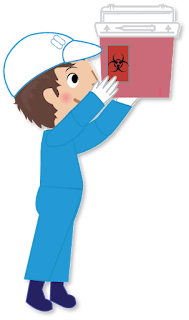Biohazardous waste, often known as infectious waste, is garbage that has been contaminated with potentially infectious agents or other elements that present a health or environmental risk. Contaminated cultures, petri dishes, and other culture flasks, infectious agents, wastes from bacteria, viruses, and spores; sharps such as hypodermic needles, blades, and slides; human or animal blood, components of blood, body fluids, or semi-liquid materials are all examples of this waste.
Healthcare waste must be separated into distinct categories and delivered to an off-site treatment facility. For this, the medical facility should have adequately trained people and a biohazard waste transfer truck that has been approved. If the medical institution is unable to provide both services, it is recommended that they partner with a reputable pharmaceutical waste disposal firm that can do both. After that, the biohazardous materials are handled and, in certain circumstances, sent to a sanitary landfill. The waste created by medical facilities, as well as their risk to people’s health and the environment, will be removed by going through the appropriate treatment procedure.
